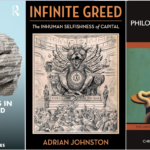News – April 2023
20% off and free global shipping on all Routledge titles for LacanOnline.com readers. Use this link and code S031 at the checkout.
Starting with new and just-announced book releases, The Ethics of Lacanian Psychoanalysis: A Conversation about Living in Joy by Yehuda Israely and Esther Pelled was published by Routledge last month. Bringing together Lacanian psychoanalysis with Zen Buddhism and Bion’s writings on psychoanalysis, the pair describe ethical questions as those about how we should live: what desires our lives should be led by, and how we might deal with relationships, cravings and separations that we cannot control. The authors outline ways in which, using Lacanian ideas, we might cultivate a passion for life so that we enjoy better and suffer less.
Coming up in July is Jorge Alemán’s Lacan and Capitalist Discourse: Neoliberalism and Ideology, translated into English by Daniel Runnels. Published by Routledge, Alemán uses Lacan’s so-called fifth discourse – that of the capitalist, as outlined in Lacan’s Milan seminar in 1972 – to provide an account of neoliberalism in the context of the Covid pandemic and the resurgence of the far right. Lacan is this short book’s primary focus, but Alemán also engages with Heidegger, Marx, Laclau, Foucault, Butler, Badiou, and Althusser.
Newly-announced for publication in October is Studying Lacan’s Seminar VII: The Ethics of Psychoanalysis, a collected of reflections on what Lacan’s ethics offers to psychoanalysis today. It is edited by Carol Owens, who co-edits previous collections in this series. A rich and considered Seminar which sees Lacan range from das Ding, Antigone, sublimation and ‘the Good’, the essays in this volume promise a radical engagement of what it means to act in conformity with one’s desire – with respect to racism, inequality, capitalism, education and subjectivity.
Also just-announced for release in November is The Direction of Desire: John of the Cross, Jacques Lacan and the Contemporary Understanding of Spiritual Direction by Mark Murphy, part of the Palgrave Lacan Series. Reading Lacan’s four discourses with the writings of the mystic whose teaching is so important to the Catholic spiritual tradition, Murphy argues that John of the Cross and Lacan share a concern with “reinvigorating spiritual direction.” Against what he labels a “positive affective experientialism,” Murphy finds in Lacanian psychoanalysis a more radical notion of desire, one which is not therapy-focused in the way in which a relationship with God is measured.
Turning to events, at the Center for the Clinical Arts on Thurs 4th May 6pm CST / 7pm EST / 8pm Brasília Nate Koser will be presenting a clinical case ‘On the Link of Free Association and Repetition.’ Koser will highlight how what Freud termed the ‘fundamental rule’ of psychoanalysis creates the opportunity of showing its intimate connection with what might be considered another ‘fundamental’ – that is, foundational and essential – occurrence in a psychoanalytic treatment: repetition.
Stijn Vanheule will be giving an online talk on ‘The clinic of psychoanalysis in times of capitalism’ on Sun 7th May at 3pm EST, exploring the particularities of the capitalist discourse and discussing its fundamental differences with respect to the other discourses. The event is free to join and full details, including Zoom links, are here.
Also on Sun 7th May, at 7pm AEST, the Lacan Circle of Australia will host Frank Rollier to discuss in conversation ‘The Crisis of Authority and the Contemporary Discontent of Civilisation’, ahead of the NLS Congress on this topic later this month. The event is free and open to all.
The NLS Congress itself, on Discontent and Anxiety in the Clinic and in Civilisation, will take place 20th-21st May online. The deadline for registration is 17th May, and a personal Zoom link will be sent according to language preference (English or French) on registering. The Saturday of the Congress will feature parallel sessions on the clinic of anxiety, while the Sunday will be spent with plenary sessions focussed on four current forms of discontent – conspiracies, the body, war, and disasters – followed by a clinical conversation.
On YouTube, Clint Burnham interviews Matthew Flisfeder for Lacan Salon. Flisfeder is author of Algorithmic Desire: Toward a New Structuralist Theory of Social Media (2021) and here discusses his recent article on the TV show Severance, his work on digital capitalism from a Hegelian perspective, and his take on the Lacanian scene in Canada today.
Also on YouTube, Prof Richard Boothby discusses his latest book, Embracing the Void, in a conversation with Cadell Last for Philosophy Portal. Presenting his book as an expansion and a kind of corrective, from a Lacanian perspective, to Freud’s critique of religion, Boothby discusses the centrality of das Ding, the paradoxes of the Oedipus complex as highlighted by Lacan, and the unknowing God.
Finally, readers may be interested to know that a new Slavoj Žižek title, Freedom: A Disease Without Cure, will be released in October. Against the libertarian individualist conception, Žižek argues that the experience of radical freedom is fragile and transient, but that a deeper understanding of it produces hope in dark times. Expect references to Lacan alongside Kierkegaard, Heidegger, Agatha Christie and Alexandria Ocasio-Cortez.
Got news? Get in touch.




Leave a Reply